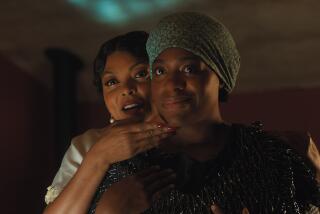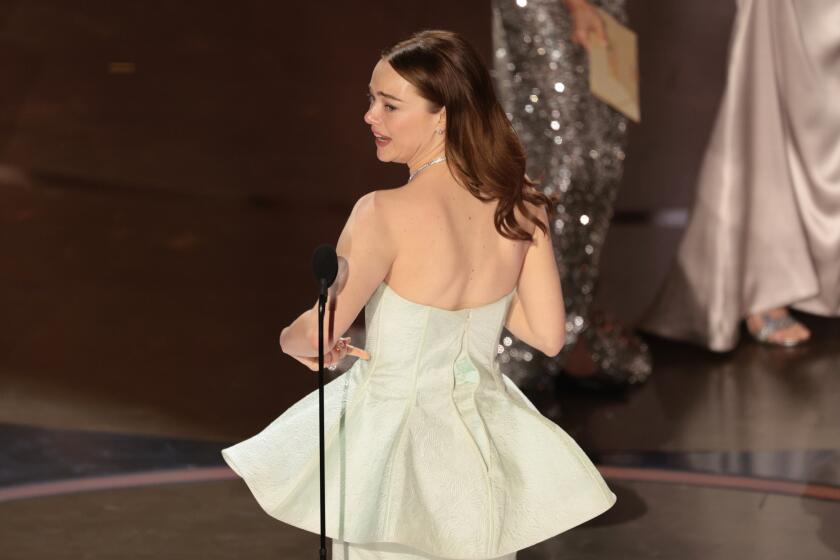Teresa Wright, 86; Was Nominated for an Oscar in Each of 1st 3 Films
Teresa Wright, who insisted on doing Hollywood her way and became the only actor ever nominated for Academy Awards in each of her three initial pictures, winning for “Mrs. Miniver,” has died. She was 86.
Wright, died Sunday of a heart attack at Yale-New Haven Hospital in Connecticut.
A Broadway actress, Wright came to Hollywood at the invitation of Samuel Goldwyn, who had seen her on stage in “Life With Father,” to play Bette Davis’ daughter in 1941’s “The Little Foxes.” Wright earned an Oscar nomination for best supporting actress in the role.
She followed that triumph the next year with two more nominations, for best actress as the wife of Gary Cooper’s Lou Gehrig in “The Pride of the Yankees,” and for best supporting actress as the girlfriend of Greer Garson’s son in “Mrs. Miniver,” for which she won the Oscar.
Her fourth film garnered no Oscar nomination, but was a classic nonetheless. She played the innocent niece to Joseph Cotten’s serial killer in Alfred Hitchcock’s “Shadow of a Doubt.” After that came leading roles in “Casanova Brown” and “The Best Years of Our Lives.”
It’s little wonder that then-Times drama editor Edwin Schallert described Wright’s fledgling career as “one of the most remarkably brilliant for a young player in Hollywood.”
Despite her meteoric matriculation into movies, Wright wanted no part of the typical studio publicity for actresses of that era. She insisted she was no glamour girl and staunchly refused to pose for photos wearing bathing suits or to endure gossipy fan magazine interviews.
Her insistence on a contract clause precluding cheesecake photos garnered more publicity than the photos ever could, and irked her studio.
“My idea then was that I wouldn’t look good, that my acting was better than my figure, and that others could do it better,” she told Hollywood columnist Hedda Hopper in 1950.
Initially understanding about her attitude, Goldwyn told her he was not of “the bathing suit school of Hollywood producers.” He cast her as the wholesome daughter, wife or sweetheart and never the seductress. But he suspended her at various times, and fired her in 1948 for being “uncooperative” when she refused to travel to publicize a movie.
“I will gladly work for less if by doing so I can retain the common decency without which the most acclaimed job becomes intolerable,” she told The Times during the wildly public brouhaha more than half a century ago.
The ouster might have cost Wright her $125,000 pay, but not her ability to land prestigious roles. Although she made her next film for only $20,000, it was another classic: 1950’s “The Men,” opposite Marlon Brando in his movie debut.
By 1953, although she was only in her early 30s, Wright moved into character roles, playing Jean Simmons’ mother in George Cukor’s “The Actress.”
Over her long career, Wright appeared in about 28 movies, most recently as the eccentric landlady Miss Birdie who befriends Matt Damon in Francis Ford Coppola’s 1997 “The Rainmaker.” But she never revised her less than enthusiastic opinion of the medium.
“I wouldn’t pursue film, and I didn’t back then,” she advised would-be actors in a USC class in 1982, when she was in Los Angeles appearing in “Mornings at Seven” at the Ahmanson Theater. “I’d use every angle to try to get into a repertory company.”
Wright did intersperse her illustrious stage career with considerable work on television from its inception, beginning with such live dramatic anthology series as Lux Video Theater.
She was nominated for Emmys three times: for playing the teacher Annie Sullivan in the 1957 CBS production of “The Miracle Worker,” as the famed photographer in “The Margaret Bourke-White Story” on NBC in 1960, and for a guest role on the brief CBS series “Dolphin Cove” in 1989.
Born Muriel Teresa Wright in New York City on Oct. 27, 1918, she decided to become an actress after seeing Helen Hayes on stage in “Victoria Regina.” Her first name was dropped when she discovered another actress named Muriel Wright registered with Actors Equity.
Wright acted in high school plays in Maplewood, N.J., and, although one teacher suggested that she stick to typing, a teacher of public speaking coached her and gave her plays to read. He also arranged for her to spend two summers at the Wharf Theater in Provincetown, Mass.
In 1938, she landed an understudy role in “Our Town” on Broadway and then toured in the play.
Next came her impressive Broadway debut as Mary in “Life With Father” in 1939, prompting playwright Lillian Hellman to suggest that Goldwyn hire her for the screen version of Hellman’s “Little Foxes.”
Wright returned to Broadway after her Hollywood years in 1957 as Pat Hingle’s wife in “The Dark at the Top of the Stairs.” Other memorable stage performances followed as Alice the adult daughter in “I Never Sang for My Father” in 1968 written by her then-husband Robert Anderson, and as Linda Loman opposite George C. Scott’s Willy in the 1975 revival of Arthur Miller’s “Death of a Salesman.”
She also portrayed the stern aunt Lily in a 1975 Broadway revival of Eugene O’Neill’s “Ah, Wilderness!” and in “Mornings at Seven” on Broadway and on tour.
Married and divorced from Niven Busch, Robert Anderson and Carlos Pierre, Wright is survived by her two children with Busch, Mary Kelly Busch of Clinton, Conn., and Niven Terrence Busch of Indianapolis, Ind.; and two grandchildren.
More to Read
Only good movies
Get the Indie Focus newsletter, Mark Olsen's weekly guide to the world of cinema.
You may occasionally receive promotional content from the Los Angeles Times.






